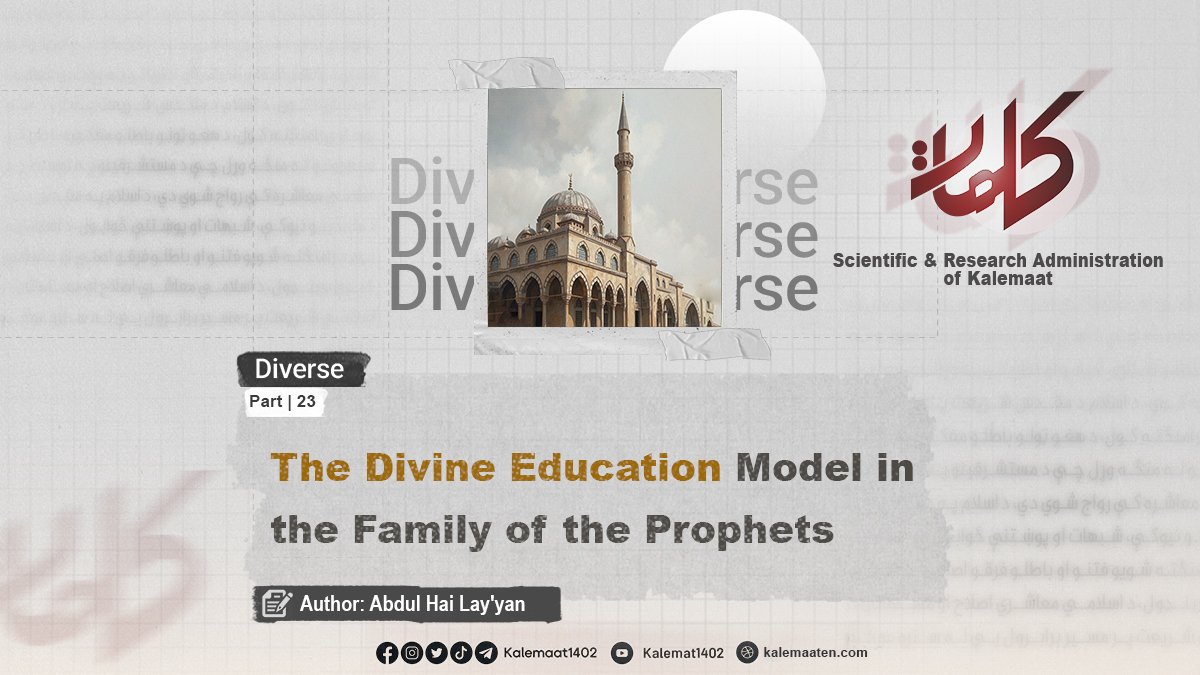Author: Abdul Hai Lay'yan
The Divine Education Model in the Family of the Prophets (Part 23)
At this time, Noah (peace be upon him) prayed against them and said: “وَقَالَ نُوحٌ رَّبِّ لَا تَذَرْ عَلَى الْأَرْضِ مِنَ الْكَافِرِينَ دَيَّاراً * إِنَّكَ إِن تَذَرْهُمْ يُضِلُّوا عِبَادَكَ وَلَا يَلِدُوا إِلَّا فَاجِراً كَفَّاراً“.[1]” Translation: Noah (continued his supplication and) said: O Lord! Leave not a single one of the disbelievers alive on earth, for if You leave them, they will mislead Your servants, and they will beget none but wicked and stubborn disbelievers.
Then Allah, the Exalted, commanded him to build an ark so that he and those who had believed with him would be saved when the punishment descended upon the disbelievers of his people. When Noah (peace be upon him) finished constructing the ark, Allah commanded him to carry into it every pair of creatures (male and female), and his family except those for whom the decree of destruction had been issued, and those who had believed. He carried this out according to the command of his Lord. Thus, Allah Almighty saved him and those who were with him, and drowned those who denied Him, His Oneness, His Prophets, and His Messenger Noah (peace be upon him). Allah the Exalted says: “فَكَذَّبُوهُ فَنَجَّيْنَاهُ وَمَن مَّعَهُ فِي الْفُلْكِ وَجَعَلْنَاهُمْ خَلاَئِفَ وَأَغْرَقْنَا الَّذِينَ كَذَّبُواْ بِآيَاتِنَا فَانظُرْ كَيْفَ كَانَ عَاقِبَةُ الْمُنذَرِينَ“.[2]” Translation: They denied him, but We saved him and those who were with him in the Ark, and We made them successors, and We drowned those who denied Our signs. Behold then how was the end of those who had been warned.
And He says: “وَاصْنَعِ الْفُلْكَ بِأَعْيُنِنَا وَوَحْيِنَا وَلاَ تُخَاطِبْنِي فِي الَّذِينَ ظَلَمُواْ إِنَّهُم مُّغْرَقُونَ“.[3]” Translation: And build the Ark under Our eyes and by Our revelation, and do not plead with Me concerning the wrongdoers; surely they will be drowned.
Then He says: “حَتَّى إِذَا جَاء أَمْرُنَا وَفَارَ التَّنُّورُ قُلْنَا احْمِلْ فِيهَا مِن كُلٍّ زَوْجَيْنِ اثْنَيْنِ وَأَهْلَكَ إِلاَّ مَن سَبَقَ عَلَيْهِ الْقَوْلُ وَمَنْ آمَنَ وَمَا آمَنَ مَعَهُ إِلاَّ قَلِيلٌ“.[4]” Translation: Until when Our command came and the oven gushed forth, We said: Carry in it two of every kind, male and female, and your family—except those against whom the word has already gone forth—and those who believe. And none believed with him except a few.
And Allah the Exalted says: “فَأَنجَيْنَاهُ وَمَن مَّعَهُ فِي الْفُلْكِ الْمَشْحُونِ * ثُمَّ أَغْرَقْنَا بَعْدُ الْبَاقِينَ“.[5]” Translation: So We saved him and those with him in the fully laden Ark, then afterward We drowned the rest.
The Position of Noah’s Family and Parents Regarding His Call
One of the important aspects of the story of Prophet Noah (peace be upon him) and his long mission is the reaction of his close relatives, namely his family and parents. This part of his life shows how, even in the face of severe opposition from his people, some of those closest to him—including his parents—stood with him faithfully. This loyalty stands in contrast to the disobedience of some other family members, which became a great test of faith for a divinely appointed Prophet.
The Reaction of His Family to His Call
The family of Noah (peace be upon him) were among those who followed him and believed in his mission. Only his wife and one of his sons did not follow him, which will be discussed later. The reason for his family’s belief in him is found in the statement of Allah Almighty to Noah (peace be upon him), when He commanded him to carry those who had believed with him in the Ark to save them from drowning: “حَتَّى إِذَا جَاء أَمْرُنَا وَفَارَ التَّنُّورُ قُلْنَا احْمِلْ فِيهَا مِن كُلٍّ زَوْجَيْنِ اثْنَيْنِ وَأَهْلَكَ إِلاَّ مَن سَبَقَ عَلَيْهِ الْقَوْلُ وَمَنْ آمَنَ“.[6]” Translation: Until when Our command came and the oven gushed forth, We said: Carry in it two of every kind, male and female, and your family—except those against whom the word has already gone forth—and those who believe.
The Reaction of Noah’s Parents to His Call
The father and mother of Noah (peace be upon him) were believers who affirmed his mission. For this reason, Noah (peace be upon him) prayed to his Lord, asking forgiveness for them, saying: “رَبِّ اغْفِرْ لِي وَلِوَالِدَيَّ وَلِمَن دَخَلَ بَيْتِيَ مُؤْمِناً وَلِلْمُؤْمِنِينَ وَالْمُؤْمِنَاتِ وَلَا تَزِدِ الظَّالِمِينَ إِلَّا تَبَاراً”.[7]” Translation: My Lord! Forgive me, my parents, whoever enters my house as a believer, and all believing men and women. And do not increase the wrongdoers except in ruin.
The commentators state that the parents of Noah (peace be upon him) were believers.[8]
Sayyed Qutb (may Allah have mercy on him), in his commentary on this noble verse, says: The supplication of Prophet Noah for forgiveness from his Lord reflects the noble manners of a Prophet in the presence of the Almighty. It is the humility of a servant before his Lord—one who never forgets that he is human, who errs and falls short, no matter how much he obeys and worships. He knows that he will not enter Paradise by his deeds alone unless Allah grants him His grace. Just as his noble brother, the Prophet Muhammad (peace be upon him), said: “None of you will enter Paradise by his deeds.” They asked: Not even you, O Messenger of Allah? He said: “Not even me, unless Allah covers me with His mercy and grace.”[9]
Continues…
Previous Part / Next Part
References:
[1] Surah Noah, 26–27
[2] Surah Yunus, 73
[3] Surah Hud, 37
[4] Surah Hud, 40
[5] Surah Ash-Shu‘ara, 119–120
[6] Surah Hud, 40
[7] Surah Noah, 28
[8] Al-Wahidi, Tafsir al-Wasit, Beirut: Dar al-Kutub al-‘Ilmiyyah, 1415 AH, vol. 4, p. 360; al-Shawkani, Fath al-Qadir, Beirut: Dar al-Fikr, 1415 AH, vol. 5, p. 375; al-Mawardi, Tafsir al-Mawardi, Kuwait: al-Turath al-Islami, 1402 AH, vol. 4, p. 316; Abu al-Su‘ud, Irshad al-‘Aql al-Salim ila Mazaya al-Qur’an al-Karim, Beirut: Dar Ihya’ al-Turath al-Islami, vol. 9, p. 42.
[9] Sayyed Qutb, Fi Zilal al-Qur’an, vol. 6, p. 3717



